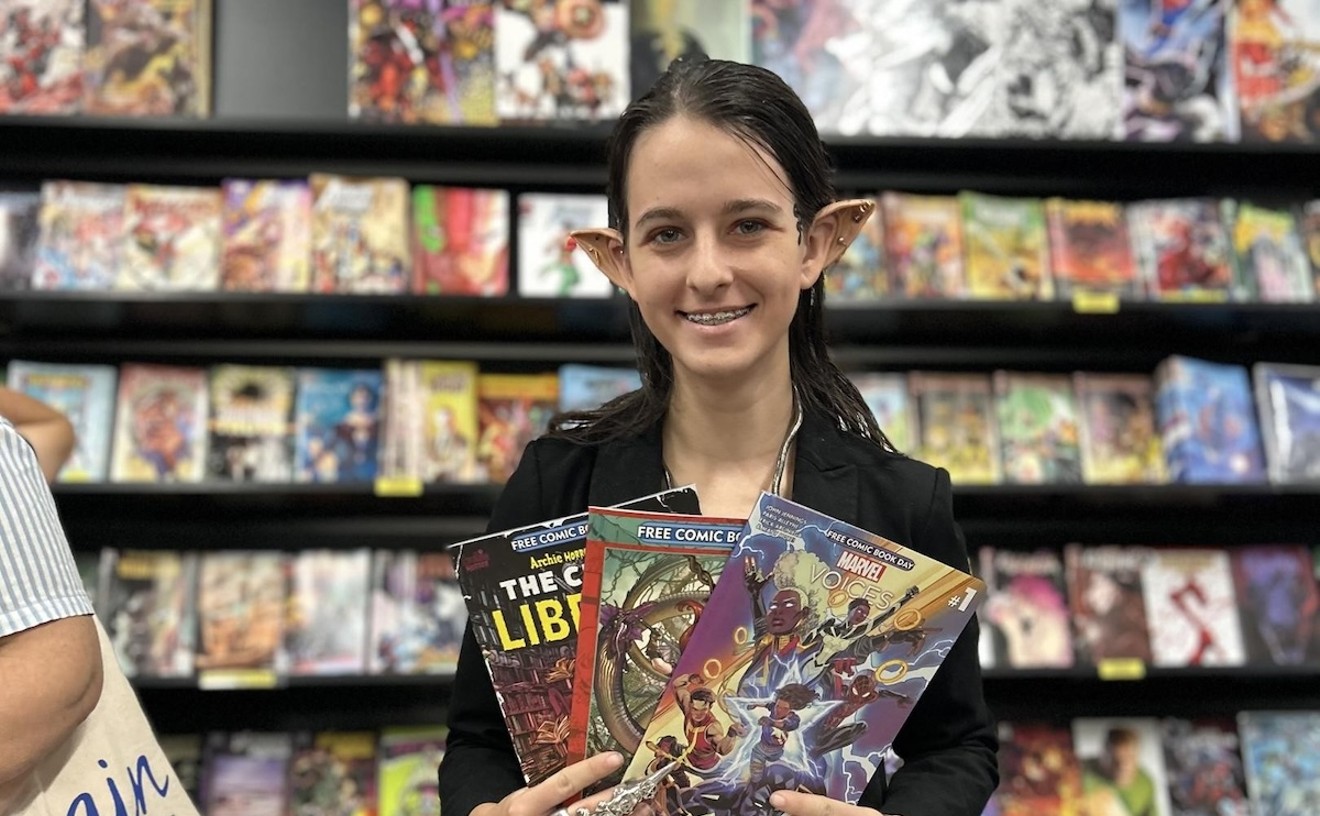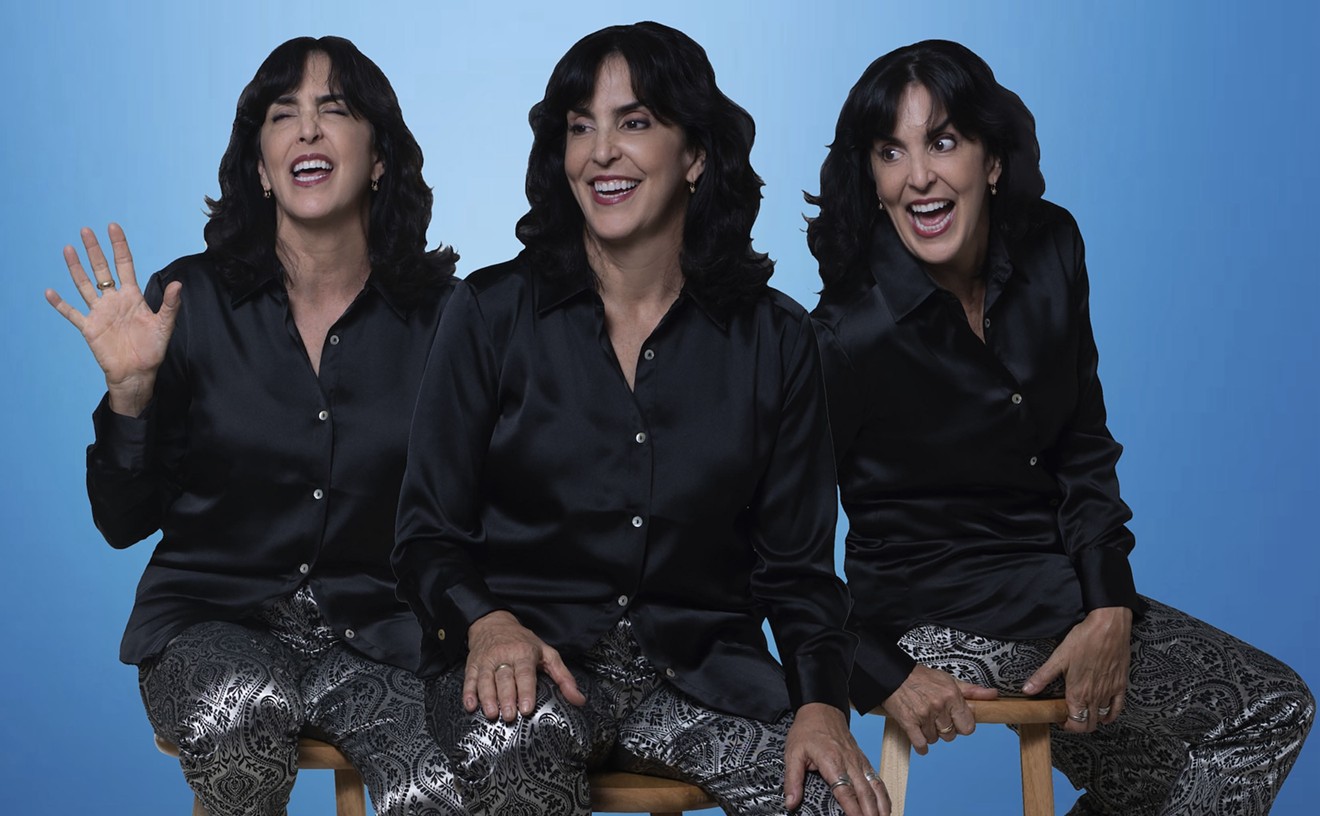Although the Hollywood Playhouse's lobby boasts an exhibit of yearbooks, photos, and other Brooklyn memorabilia from the time of Meet Me at the Pitkin's Fifties setting, the creators of this musical believe that nostalgia ain't what it used to be. They deliver an infectiously silly sendup of backstage stories and popular music, presented through a revue of parodic lyrics matched to old Yiddish folksongs and Your Hit Parade standards. Loosely structured on the rise to stardom of the fictitious singing group the Pitkin Four, the musical begins at a condo in present-day Boca. There, Elly (Margot Moreland) and her husband Marty (Louis Silvers), along with their old partners in the act, Molly (Heather Jane Rolff) and her mate Phil (Oscar Cheda), learn that Brooklyn's Pitkin movie theater is slated for demolition. The news carries their memories back to the place where they launched their careers, sending Meet Me at the Pitkin in a flashback to post-World War II Brooklyn.
Working at the theater as ushers and projectionists, the four starstruck kids watch the Pitkin's live stage shows between reels, then spend late nights putting together their own act. Of course, there are obstacles: Elly wishes Marty would go back to work in her father's store, and the Yiddish of Irish Catholic Molly needs work. But the act takes off when the gang comes up with the idea of singing witty sendups of the Yiddish songs they heard growing up, as well as of the hits offered up by the Pitkin's headliners. Making fun of Jewish conventions and New York icons, the group wins fame with brief, bouncy numbers such as "Yeshiva" (to the tune of "Fever"), "Blame It on the Cosa Nostra" ("Blame it on the Bossa Nova"), and "The Joint Is Kosher!" ("The Joint Is Jumpin'"). Finally, the musical tastes of the Sixties send the quartet into semi-retirement in Boca, until they gather for one last private reprise in the shuttered Pitkin.
The Yiddish Mickey Rooney/Judy Garland story line soars in the hands of a fresh-faced cast powered by pure chutzpah. Straight from her standout performance as the Spanish-speaking new mother in Summer Shorts '97, Moreland once again proves that talent is the universal language by reaching out across the footlights and belting the Yiddish lyrics with confidence. As her husband, Silvers gives a relaxed and affable performance that fits him as comfortably as Perry Como's sweater. Rolff and Cheda also charm as they move easily between the episodic revue-style musical numbers and the structured backstage plot. And the cast receives plenty of up-tempo support from the four-piece ensemble led by pianist Phil Hinton that, in a rare treat, adds woodwinds (Julianne Purefoy) to the upright bass (Dave Tomasello) and drums (Ken Hebden).
Director Andy Rogow instills a welcome light touch to this feathery revue, keeping the production moving along to the next musical joke without building in unnecessary pauses for the underdeveloped dramatic moments. Similarly, Jamie Cooper's lively choreography is entertaining, and its simplicity mimics the limited moves the Pitkin Four would probably have created.
Gary Waldman, who wrote the book and original lyrics, composed the original music (with Todd Rice and Jon Delfin), designed the production (with Rogow), and co-produced the musical, has come up with a pleasant entertainment but perhaps has limited his creation's potential by spreading himself too thin. After a whirlwind first act, his story drags during an overlong Catskill tribute and a Pitkin Four world tour. With minimal sets and simple costumes, he treats the work's physical demands like the songs he parodies, expecting the audience to make do with only a sketchy frame of reference. On the other hand, two of his original songs, the hummable "Meet Me at the Pitkin" and the touching "I Remember Everything," suggest that this is where his real talent lies.
Like all spoofs, Meet Me at the Pitkin works best if you know the Yiddish songs or the New York landmarks that are being lampooned. The opening-night audience sang along to the folksongs, clapped in time to remembered hits, and even loudly opined "That's true" to bits of dialogue. Most of the material was new to me, however, which only seemed to make the comedy that much fresher and more novel.
If you don't have a vast knowledge of the people and events involved in the early days of radio and television, you will not fare as well with playwright Trude W. Martin's fascinating yet maddeningly incomplete one-woman show The Theory of Relatives, which features Elayne Wilks in the true-life show-biz success story of Gertrude Berg.
Born in 1900, Berg became a household name 28 years later when she starred in radio's The Rise of the Goldbergs. Less than seven years after American women were granted voting rights, the married mother of two had her second radio show -- she not only starred in them but wrote the scripts for both series. Berg went on to triumph as a writer and actress on Broadway and in the then-new medium of television.
In the first of its three parts, The Theory of Relatives opens in 1954 with Berg awaiting the arrival of Edward R. Murrow and his television crew for a taping of the interview show Person to Person. She nervously considers anecdotes she can relate about her Polish immigrant grandfather who lived across the street from her family in New York's tenements, and about her teen years as the daughter of a Catskill hotel owner. Of course, she understands that Murrow really wants to talk about her alter ego, Molly Goldberg, the character who won America's hearts as she guided her struggling family's fortunes for eighteen years on radio, then successfully transferred to television in 1949. In addition to her success on radio and her Emmy win on television, Berg also took her versatile creation to Broadway when she wrote and starred in Molly and Me. (In 1973 Kay Ballard stepped into the role in the short-lived musical Molly).
Part two takes place in 1957, the year red-baiting Sen. Joseph McCarthy died, as Berg agonizes over the blacklisting of actor Philip Loeb, who played her television husband Jake; the blacklisting led to the program's cancellation and, later, to Loeb's suicide. The final section of the play finds her in 1959, seven years before her death, once again on top with a Tony Award-winning performance in playwright Leonard Spigelgass's A Majority of One.
Crammed into a little more than an hour with no intermission, The Theory of Relatives skips over dates and muddles the chronological events in Berg's life; sadly, the missing information is not even supplied in the program. Yet that is only one of the contextual flaws in Martin's skimpy biographical overview. For example, Berg relates a story about befriending an interracial couple during her brief residency in Louisiana in the early Twenties, but she does not relate the prejudices she must have encountered there as a Jew. Likewise, the play fails to delve deeper than the prototypical supermom's passing worries that she paid more attention to her career than to her son and daughter, even though the show takes its title from Molly Goldberg's insistence that Einstein was mistaken when he said that time is relative; Molly believed that time is "relatives," and that history is passed down and strung together through the years via relationships.
In a major dramatic mistake, Martin has Wilks tell most of Berg's story as if rehearsing for Murrow's interview or in an imaginary inner dialogue with Molly; this results in Wilks talking to herself instead of to the audience. And while Wilks and director Rafael Blanco succeed in avoiding a static production by keeping the actress in constant motion and varying her storytelling poses, neither the actress nor the director supplies any of the helpful pauses needed to add shading to her account.
Mik Myles's attractive set design depicting Berg's home and Molly's trademark windowsill features a number of framed old photographs. Those photos suit this production, which offers only a tantalizing two-dimensional glimpse of a bygone era and left me wanting to peek around the frames -- and beyond the script's limits -- to know more about the people in the pictures and the stories they could tell.
Meet Me at the Pitkin. Original lyrics and book by Gary Waldman; original music by Todd Rice, Jon Deflin, and Gary Waldman; directed by Andy Rogow; with Oscar Cheda, Heather Jane Rolff, Margot Moreland, and Louis Silvers. Through August 15. For more information call 954-922-0404 or see "Calendar Listings."
The Theory of Relatives. Written by Trude W. Martin; directed by Rafael Blanco; with Elayne Wilks. Through August 10. For more information call 800-841-6765 or see "Calendar Listings.










